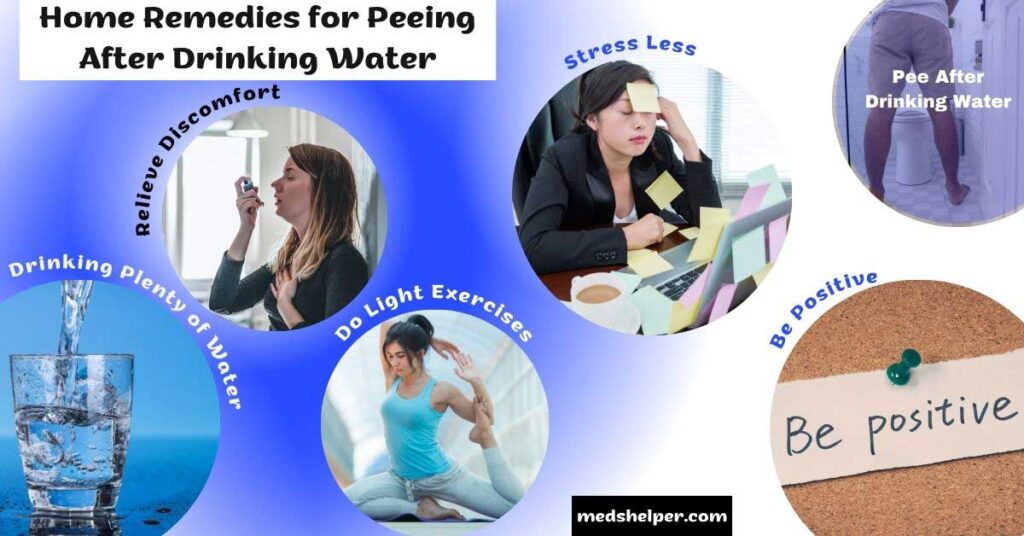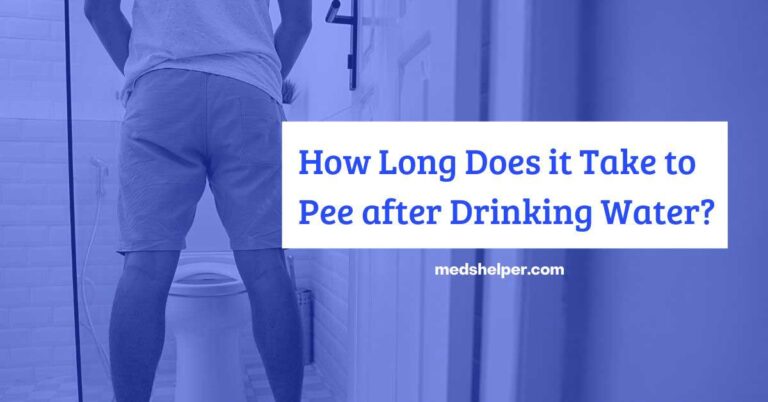Drinking 2 liters of water daily might make you wonder how long it takes to pee after drinking water. The average time it takes you to pee depends upon many factors.
This article will tell you how often you should go to the bathroom after drinking water. It also explains how often you should go to the toilet every day.
Let’s get in.
How Long Does It Take To Pee After Drinking Water?
Table of Contents
After drinking lots of water, your body will need to move all that liquid out of your system into your bladder. That is where you keep the pee.
The body uses osmosis to move liquid from the kidneys and digestive tract into your bladder. You will feel the urge to urinate frequently due to this process.
Bladder function is the cycle that involves water and food intake and urine excretion with kidneys and bowels. This migration process can cause you to feel that you must urinate more often than usual.
Several factors influence how long it takes to pee after drinking. How long does it take to pee after drinking water? Peeing after drinking water can take 10 to 15 minutes if your bladder has already filled. If your bladder is empty, urinating will take approximately 9–10 hours.
Timing of Urination: a Chart on How Long Does It Take To Pee After Drinking Water
| Category | Normal peeing rate | bladder Capacity |
| Infant (less than 1-year-old) | 15 minutes after drinking water | A baby’s bladder capacity is approximately 1-2 ounces. It fills in an hour. |
| Toddler (1-3years old) | 1 Hour after drinking the water | The bladder capacity of a toddler at 3-5 ounces is filled in two hours. |
| Category: Children (4-16years) | Drink water for 30 minutes to an additional hour | A child’s bladder can hold 7-14 ounces and fills within 2 to 4 hours. |
| Category: Adult Male (16 yrs+) | 2-4.25 hours following drinking water | An adult male’s bladder capacity is 16-24 ounces. It gets full in 8 to 9 hours. |
| Adult female (16 years and older) | Approximately 2-2.25 hours after drinking water | A female adult has a 16-24 ounces bladder capacity. The bladder fills up in 8 to 9 hours. |
Safe Storage: Can You Keep Urine For Later?
Although you can sneeze where you like, it isn’t easy to do so when urinating. You may need to hold your urine sometimes, but you should stop if it becomes a chore. Your body will eventually become irritable if there is a lot of liquid waste. Holding the urine for a few seconds is fine until you can go to the bathroom.
But, if you wait too long, you could have unpleasant and possibly even deadly consequences. It can weaken the bladder muscles if you keep your urine in your system for too long. Incontinence and the inability to empty your bladder can all be caused by this. The bacteria buildup in the urine can cause infections. It can also increase your chances of developing kidney disease.
How to Stop Drinking So Much Water?
Here are some things you can do if you discover that you have excessive pee in your water.
- Eliminate Caffeine. Caffeine and alcohol can cause overactive bladder symptoms. Caffeine causes you to urinate more frequently by acting as a diuretic.
- Water wisely: This might seem complicated when you are trying to reduce your fluid intake. Concentrated urine can result from excessive liquid intake.
- Salt water: Salt water can help your body replace lost to sweat, urine, and other bodily liquids.
- Lifestyle changes: Increase intake of fiber and vegetables. Yarn is good for constipation prevention and can help lower your bladder pressure.
- Medication: Take ant diuretics during the day instead if they are prescribed as part of your medication. This will allow you to empty your bladder before you go to bed.
Speeding up the Process: Tips for Accelerating the Process of Urination After Drinking Water
At this point, it’s impossible to give an exact answer. Many people recommend drinking lots of water before going to sleep so that you can wake up feeling energized and ready for the day. Others suggest immediate urination after drinking water before bed. You’ll have to experiment and find what works best for your needs.
You will see a rapid increase in your urine if you drink lots of fluids. Your body is pushing out excess water very quickly. Utilizing after-drinking water will speed up this process. If you want to do this at home, use a cover for the toilet seat or sit on a potty chair before going to the bathroom. You can then urinate in the bowl. This reduces time spent at the toilet.
It would help if you washed your hands after you have done this. Infections can occur if bacteria are not removed from the pee.
Say Goodbye to Urinary Discomfort: Home Remedies for Peeing After Drinking Water

Sometimes you might have difficulty urinating. This can happen if you have kidney disease or you are dehydrated. For such situations, the following home remedies could be helpful:
1. Stay Hydrated, Stay Healthy: The Importance of Drinking Plenty of Water
You should drink more than 8 glasses daily. You can hydrate your body by increasing your fluid intake. Even if it isn’t your thirst, you must drink water. This will allow you to urinate faster. Get liquids
There are many unsweetened fruit juices that you can also enjoy. Although coffee and alcohol can increase the rate of urination, doctors do not recommend them.
Additionally, alcohol abuse can lead to liver cirrhosis. It is best to avoid drinking alcohol daily and only drinks moderate amounts of coffee.
2. Stay Cool: How Cold Compress Can Help Relieve Discomfort
Apply a cold compression to the hypogastric (lower abdomen) area. Because the cold compress is hot, it will encourage urination. For 2 minutes, apply the cold compress to the site.
Avoid allowing the compress to sit still in any one spot, as it could cause damage to the skin. You should move the compress from the hypogastric area to the other side for 10 to 15 minutes.
3. Get Up and Move: Do Light Exercises
Light exercises, such as stretching and squatting, can be done while you walk. These exercises will improve blood flow and cause you to pee.
However, please don’t overdo it; heavy exercises can make you sweat. Your urge to pee could be reduced if your sweat is very dry.
4. Strengthening Your Core: The Benefits of Performing Kegel Exercises
This exercise will help you urinate more efficiently by strengthening your pelvic muscles. You can do this by contracting the muscles you use to stop urinating.
Keep this position for five to ten seconds. Exercise your Kegel muscles 3-5 times daily to control your urination better.
5. Stress Less: Tips for Learning How to Relax
Stress can lead to dysfunctional bodies. It is important to keep calm and relaxed. You can meditate and psyche the body for any negativity or negative thoughts. An open mind will help your body function more efficiently.
6. Look on the Bright Side: Be Positive
Positive thinking can be one of the home remedies for peeing. But, it is often forgotten about. Your mind is an effective tool for overcoming many illnesses. Your body will respond positively if you think. Try it.
Lifestyle Changes that Promote Bladder Health
Incontinence can be caused by tension, diet, and obesity.
1. Consume More Vegetables and Fiber
It may also help to reduce bladder pressure.
2. Reduce Tension
Intense situations can make it seem like you need to pee. Deep breathing exercises are one tool that can help ease anxiety.
3. Exercise Your Way to Better Health
Losing weight will help to keep excess pounds from putting pressure on the bladder. Exercise can cause stress incontinence.
4. Stand Straight When You Urinate
Lie down on the bathroom floor. Avoid leaning forward, as this could cause unnecessary stress to your bladder and the urethra.
Frequently Ask Questions
Why Is Boiling Water So Popular In China?
Chinese medicine considers balance to be essential. Warm water, or hot, is believed to be necessary to balance the cold and humid and increase blood circulation and toxin elimination.
How Often Should You Urinate After Drinking Water?
A full bladder can hold 10-15 ounces. According to Mayo Clinic/Cleveland Clinic, everything will likely be fine if you drink enough water to keep your body hydrated and urinate 6 to 7 times per 24 hours (or approximately every 2.5 hours).
How Long Does It Take To Pee After Drinking A Liter Of Water?
If you’re well hydrated and your bladder is full of water, it will take 5 to 15 minutes for you to have to pee after drinking. You may need to urinate for up to nine hours if your bladder is full or dehydrated.
How Long Does It Take To Pee After Drinking 3 Cups Of Water?
If you’re well-hydrated, your bladder is full of water, and it takes 5 to 15 minutes for you to have to pee after drinking. You may need to urinate for up to eight hours if your bladder is full or empty.
How Long Does Water Take To Reach Bladder?
A Liter of fluid can take 3hrs to go through the human body. It takes fluid about three hours to get to the bladder. This is because fluid taken by mouth must pass through the digestive tract first and then into the blood circulation.
How Long Does Water Take To Digest On An Empty Stomach?
Liquids travel faster since there is less to be broken down. Plain water 10-20 min. Simple juices (clear drinks, tea, sodas) take between 20 to 40 min. Complex beverages like smoothies, protein shakes, or bone broths can take up to 60 minutes.
How Long Does It Take To Pee After Drinking Water For Drug Test?
Several variables, including a person’s state of hydration, the volume of water drank, and their metabolic rate, can affect how long it takes them to urinate after drinking water. The body typically processes and excretes the water it has consumed in between 30 and an hour.
It is crucial to keep in mind that if you consume a lot of water prior to a drug test in an effort to dilute your urine, the lab may notice this and consider it an attempt to rig the test. A misleading negative outcome might also result from consuming too much water.
Conclusion
Your body will absorb water minutes after you drink it. Unlike food, you can digest water quickly. Water that is too high in moisture is eliminated through sweating and urination.
For full bladders, you may need to urinate between ten and twenty minutes or one to two hours if you have an empty bladder. Your bladder can take 9-10 hours to produce two cups of urine.
Various conditions can lead to frequent peeing, such as pregnancy, alcohol intake, and medications. Consult your doctor if the urge to pee is more frequent than 7 times daily.


